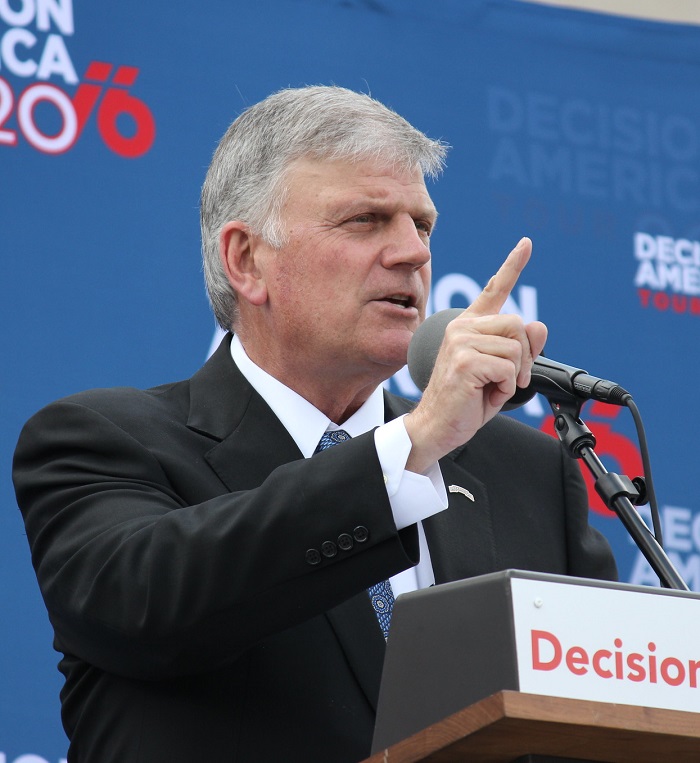After Attorney General William Barr issued a short summary of Special Counsel Robert Mueller’s report on Russian interference in the 2016 election in late March, Religious Right leader Tony Perkins, president of the Family Research Council (FRC), was quick to claim that the report vindicated President Donald Trump.
Mueller found no direct evidence that Trump tried to work with Russian operatives. But Trump had also been accused of obstructing justice by attempting to block Mueller’s investigation. Mueller determined (on the basis of a longstanding Justice Department memo against indicting a sitting president) that he lacked the authority to charge Trump in this area, but he made it clear that the president was not exonerated.
On the basis of Barr’s four-page summary of a report that ran to nearly 450 pages of text, Trump and his Religious Right allies claimed victory.
“Americans won’t get a do-over on the millions of resources the president’s enemies have wasted – or the dozens of priorities that could have taken this investigation’s place,” Perkins wrote in a column on FRC’s website. “But the Russia probe has given the country one thing: a glimpse into just how far the other side will go to delegitimize the president.”
A month later, a redacted version of the Mueller report was issued. Even with much material edited out, it was obvious that Barr’s summary was misleading, and it came to light later that Mueller felt the same way. The redacted report found “substantial evidence” that Trump had broken federal law and listed several examples of obstruction and lies by the president. It also cited instances when Trump ordered subordinates to break the law to protect him. (They refused.)
A flavor of the report is encapsulated in an anecdote that quickly made the rounds on social media and sparked a million memes: On May 17, 2017, then-Attorney General Jeff Sessions told Trump that Mueller had been appointed special counsel, leading Trump to lament in despair, “Oh my God, this is terrible. This is the end of my presidency. I’m f*cked.”
Mueller’s report lists 11 instances in which Trump may have obstructed justice, a stunning chronicle of presidential wrongdoing not seen since the Nixon administration.
Summarizing the report’s findings, The New York Times observed, “If the report – and the entire saga around the Russia investigation – has one through-line, it is the dishonesty at the heart of the Trump administration. … Mr. Mueller may have thought he couldn’t indict a president in the legal sense of the term, but he has delivered a devastating description of Mr. Trump’s attempts to abuse his powers and corrupt his aides.”
None of this – not even a documented use of a crude obscenity – has shaken the Religious Right’s faith in Trump. They continue to insist that the Mueller investigation is a frame-up designed to force Trump from office. The American Family Association called the investigation “Sham, Scam and Hoax.”
Some evangelicals go further and assert that Trump is more or less untouchable because God anointed him to run the country.
Some evangelicals go further and assert that Trump is more or less untouchable because God anointed him to run the country. One of Trump’s biggest evangelical supporters, Robert Jeffress, pastor of the First Baptist Church of Dallas, peddles this line and has apparently won a convert in Lou Dobbs, a Fox Business Channel host, who asserted after the Mueller report was issued that the investigation was part of a conspiracy to drive Trump from office.
“Pastor Robert Jeffress always talks about this president – God sent this president,” Dobbs said. “He is a person of providence. And I’ll tell you the evidence is accumulating mightily to support the pastor’s views.”
None of this is new. Fawning Religious Right leaders have been sticking with Trump no matter what he says or does since before the 2016 election. When, during the campaign, the infamous “Access Hollywood” videotape surfaced of Trump boasting about how easy it is to sexually assault women when you’re rich and famous, the heads of Religious Right groups shrugged it off.
Once in office, Trump immediately began behaving erratically. His constant use of crude language, including a comment about “sh*thole” countries in the Third World, didn’t faze his evangelical base. His frequent insults of the late U.S. Sen. John McCain (R-Ariz.), a Vietnam War veteran who as a prisoner of war was tortured for years in a facility dubbed the “Hanoi Hilton,” meant nothing to them.
After neo-Nazis and anti-fascist counter-protestors clashed in Charlottesville, Va., in August 2017, Trump insisted there were “some very fine people” on both sides – and no one in the Religious Right called him out for it. When the Trump administration pushed a policy that brutally separated refugee children from their parents at the U.S.-Mexico border, far-right “pro-family” groups defended it. Even the news that Trump had committed adultery with Stormy Daniels, an adult-film star, shortly after his third wife had given birth to their son and then paid Daniels hush money, didn’t move the needle.
Religious Right groups are also untroubled by Trump’s glaring ignorance of the Bible. He claims it’s his favorite book; but when asked to name the verse he enjoys most Trump made one up, and he also once referred to the New Testament book of “Two Corinthians” even though it’s known as Second Corinthians.
Trump’s right-wing evangelical defenders, many of whom serve on his Evangelical Advisory Board (a body whose members insist doesn’t even exist), stick with him despite his moral faults because, politically, he gives them what they want: far-right judicial appointments, attacks on legal abortion, restrictions on LGBTQ rights, a self-proclaimed defense against the imaginary “war on Christmas” and policies that foster discrimination under the guise of “religious freedom.”
Trump’s right-wing evangelical defenders, many of whom serve on his Evangelical Advisory Board, stick with him despite his moral faults because, politically, he gives them what they want: far-right judicial appointments, attacks on legal abortion, restrictions on LGBTQ rights, a self-proclaimed defense against the imaginary ‘war on Christmas’ and policies that foster discrimination under the guise of ‘religious freedom.’
Religious Right leaders’ defense of Trump has even affected how white evangelicals define morality. A recent study by two professors at the University of Notre Dame found that in 2011, 60 percent of white evangelicals agreed with the statement that a public official who “commits an immoral act in their personal life [cannot] behave ethically and fulfill their duties in their public and professional life.” That number plummeted during Trump’s campaign and afterward. It now stands at 16.5 percent.
Although Trump has many far-right evangelical defenders, seven stand out as especially sycophantic. They are profiled here.
Jerry Falwell Jr., son of the famous Moral Majority leader the Rev. Jerry Falwell
|
|
Although he’s not a minister, Falwell Jr. has taken his late father’s activism to new levels. An early advocate for Trump, he climbed aboard the campaign during the primary season at a time when many other Religious Right figures were backing other GOP hopefuls. Once in office, Trump offered Falwell the job of secretary of education. Falwell declined, but he did accept a position on a higher-education task force that was never formed. Falwell invited Trump to speak at Liberty University, the school his father founded in Lynchburg, Va., over which Falwell Jr. presides as chancellor. He has admitted that he intends to stand by Trump no matter what. In a January interview with The Washington Post, Falwell was asked point-blank by the newspaper, “Is there anything President Trump could do that would endanger that support from you or other evangelical leaders?” His one-word answer was “No.” |
When The Post noted the brevity of the reply, Falwell added, “Only because I know that he only wants what’s best for this country, and I know anything he does, it may not be ideologically ‘conservative,’ but it’s going to be what’s best for this country, and I can’t imagine him doing anything that’s not good for the country.”
The Post then asked him, “Is it hypocritical for evangelical leaders to support a leader who has advocated violence and who has committed adultery and lies often? I understand that a person can be forgiven their sins, but should that person be leading the country?”
Falwell replied, “When Jesus said we’re all sinners, he really meant all of us, everybody. I don’t think you can choose a president based on their personal behavior because even if you choose the one that you think is the most decent – let’s say you decide Mitt Romney. Nobody could be a more decent human being, better family man. But there might be things that he’s done that we just don’t know about. So you don’t choose a president based on how good they are; you choose a president based on what their policies are. That’s why I don’t think it’s hypocritical.”
He even went so far as to declare that it “may be immoral” for evangelicals to fail to support Trump.
Robert Jeffress, pastor of the First Baptist Church of Dallas, a Southern Baptist mega-church
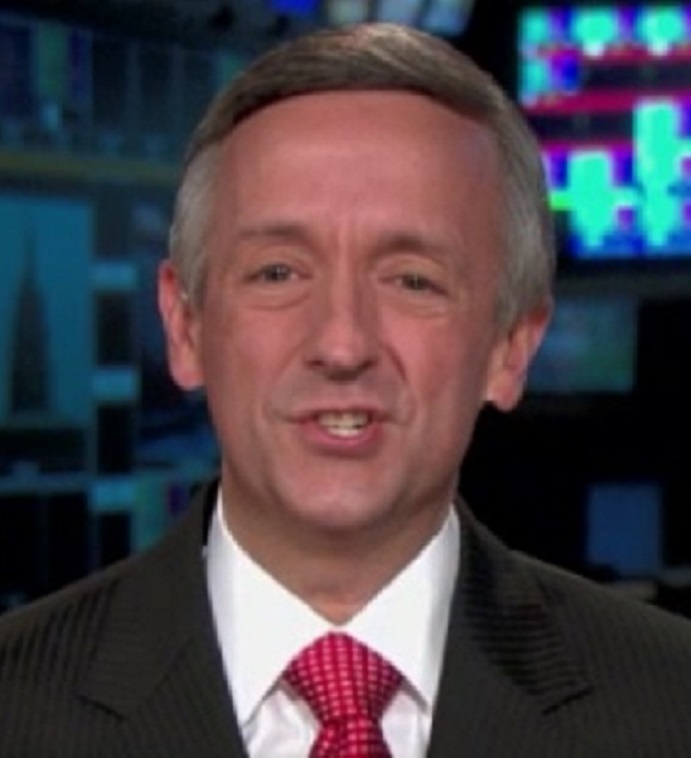 |
Like Falwell, Jeffress was an early endorser of Trump and publicly backed him in the fall of 2015. He traveled with Trump during the campaign and during a rally in Texas in February 2016 told the crowd, “Donald Trump cares about and loves evangelical Christians. … I have met with Mr. Trump on several occasions, and I can tell you from personal experience, if Donald Trump is elected president of the United States, we who are evangelical Christians are going to have a true friend in the White House. God bless Donald Trump!” Jeffress is known for his extreme anti-LGBTQ views – he has called gay people “miserable,” “filthy” and “degrading” – and is hostile toward separation of church and state and non-Christians (especially Muslims), Mormons and Catholics. He once stated that voting for President Barack Obama would pave the way for the Antichrist. |
Yet despite these harsh judgments, Jeffress repeatedly gives Trump passes for his unethical behavior.
When Trump used the word “sh*thole” to describe Third World nations in January 2018, Jeffress said it was no big deal. He told The Washington Post, “What a lot of people miss is, America is not a church where everyone should be welcomed regardless of race and background. I’m glad Trump understands the difference between a church and [a] country. I support his views 100 percent, even though as a pastor I can’t use that language.”
When the news media broke the story that Trump had cheated on his wife by having sex with Daniels and then paid to buy her silence, Jeffress waved it all off.
“Evangelicals know they’re not compromising their beliefs in order to support this great president,” Jeffress said during a Fox News interview in March 2018. “And let’s be clear, evangelicals still believe in the commandment ‘thou shalt not have sex with a porn star.’ However, whether this president violated that commandment or not is totally irrelevant to our support of him.”
(For more on Jeffress, see “The Apostle of Trump” in the July-August 2018 issue of Church & State.)
Franklin Graham, son of the late evangelist Billy Graham.
|
Photo Credit: Matt Johnson via Creative Commons |
Although Billy Graham held conservative political views, he worked to build relationships with presidents of both parties. His son doesn’t bother. Franklin Graham is a cheerleader for the Republican Party 24/7, and that includes boosting Trump. The idea that Trump was chosen by God to lead the nation is gaining in popularity among the Religious Right, and it appears to have started with the younger Graham. Shortly after the election, he told The Post, “I could sense going across the country that God was going to do something this year. And I believe that at this election, God showed up.” In May 2018, Graham expanded on this idea during an interview with the Associated Press. “I think somehow God put him in this position,” Graham said. “Because he’s not a politician, he seemed to do everything wrong as a politician: he offended many people, did the wrong things – but somehow he became president. And I just have to think that God, in some reason, put him there for a purpose. I don’t know what that is, but we need to get behind him and support him.” Graham also dismissed the Daniels story, remarking, “I don’t defend those kinds of relationships he had. But the country knew the kind of person he was back then, and they still made the decision to make him the president of the United States.” |
Graham, of course, cut President Bill Clinton no slack during his impeachment, writing an opinion column for The Wall Street Journal that asked, “If [Clinton] will lie to or mislead his wife and daughter, those with whom he is most intimate, what will prevent him from doing the same to the American public?”
President Barack Obama also came under assault from Graham, even though his eight years in office was not marked by any personal scandals. Graham still assailed Obama and once asserted, inaccurately, that Obama was born a Muslim. He also cast doubt on Obama’s Christian faith (for which he later apologized). In 2011, he flirted with “birtherism” – the discredited Trumpian conspiracy theory that Obama was not born in the United States. He also accused Obama of promoting “ungodly sexual behavior.”
Paula White, Florida-based “prosperity gospel” preacher and television evangelist
|
White is said to be one of Trump’s chief spiritual advisers. Like many in the Religious Right, she promotes the view that Trump is an instrument of God’s will. Trump, White asserts, has “been raised up by God.” She has even asserted that resistance to Trump and his agenda is an attack on God. “It is God who raises up a king,” she remarked in an August 2017 interview with fellow televangelist Jim Bakker. “It is God that sets one down. When you fight against the plan of God, you are fighting against the hand of God.” (When controversy erupted over her comments, White backpedaled by claiming that all leaders are chosen by God.) White serves as senior pastor at the New Destiny Christian Center in Apopka and heads Paula White Ministries. She has known Trump since 2000. As White tells the story, Trump reached out to her after seeing her preach on television. At the time, Trump was a reality TV star and said he felt the need for spiritual guidance. |
But White apparently failed to instruct Trump in the basics of Christian doctrine. During a July 2015 forum for conservative Christians in Iowa, Trump was asked by the moderator, GOP pollster Frank Luntz, if he had ever asked God for forgiveness for his actions, a fairly common action for Christians. Trump replied, “I am not sure I have. I just go on and try to do a better job from there. I don’t think so. I think if I do something wrong, I think, I just try and make it right. I don’t bring God into that picture. I don’t.” (During the same forum, Trump referred to taking communion in his Presbyterian church, remarking, “I drink – and have my little cracker.”)
White has repeatedly defended Trump against charges that his Christianity is a put-on designed to win political support from conservative evangelicals. In a September 2017 interview with religion journalists, she remarked, “Our president 100 percent is a Christian who understands receiving faith by the grace of the Lord Jesus. He understands repentance, and I’ve seen him on many occasions in private and even in public.” She called Trump “a person of repentance” and added, “I’ve also watched a man grow just like we are all growing.”
(For more on White, see “Pennies [And Lots Of Dollars] From Heaven,” March 2017 Church & State.)
Bryan Fischer, radio talk-show host and columnist for the American Family Association (AFA)
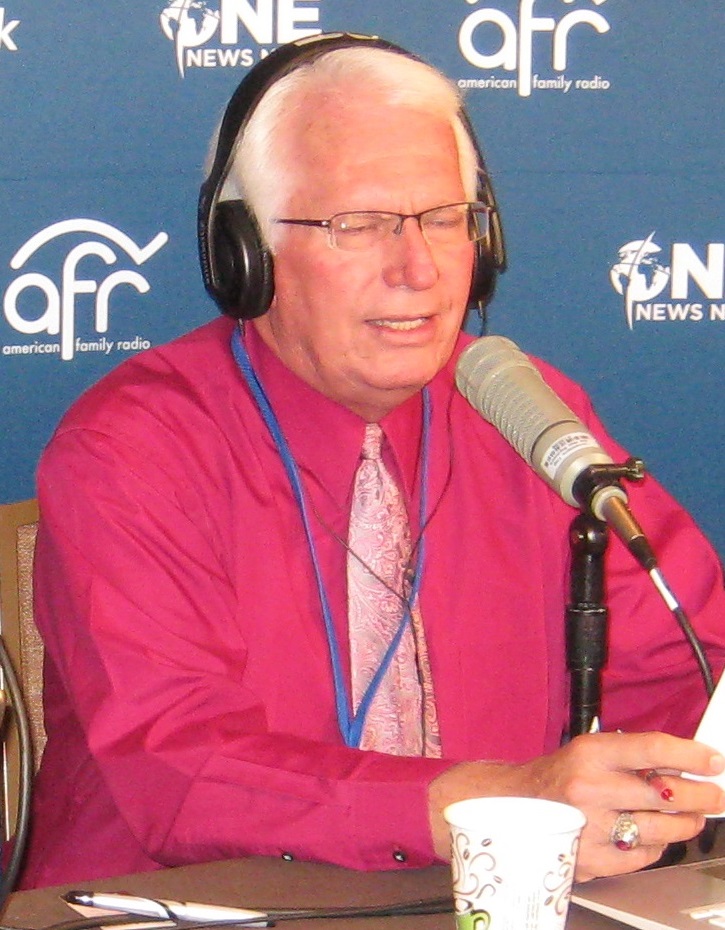 |
Fischer was formerly director of issue analysis for the AFA but was abruptly demoted in 2015. He’s notorious for making extreme statements – that religious freedom in America applies only to Christians, that Adolf Hitler recruited gay men to be his storm troopers, that Muslims are a “toxic cancer” on America, that women are unfit for public office, that animals that kill people should be stoned to death per biblical edict – and as a result enjoys a cult following among Religious Right activists. Fischer – and the AFA generally – promote Trump constantly. In July 2017 he told his radio audience, “I’m telling you, ladies and gentlemen, he’s about the only hope that we have right now. If you’re an American who cares about this country like I do, Donald Trump is the one person, the one individual who is giving us reason to hope for the future.” Following the release of the redacted Mueller report, Fischer glossed over the sections listing instances of obstruction of justice by Trump and declared the president exonerated, writing in a column, “Thus from a legal standpoint, it’s game over. Mueller exonerates Trump on collusion, Barr exonerates Trump on obstruction. Period. Over and out.” |
Aside from Fischer, the AFA uses its fake news service, OneNewsNow, to relentlessly promote Trump and his policies. A somewhat amusing, but at the same time kind of pathetic, example occurred on May 4, 2018, when OneNewsNow polled its readers on the question, “For what purposes do you think God allowed Donald Trump to become president?” Possible answers included: “To grant America a reprieve from judgment; To bless America for supporting Israel; To revive His Church in America; To demonstrate His redemptive power; and To use the foolish to shame the wise.”
Ralph Reed, longtime Religious Right operative
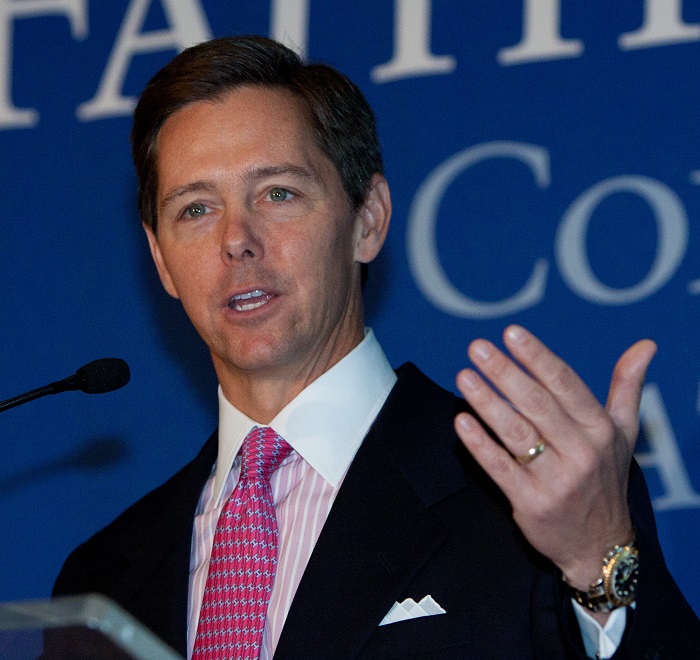 |
TV preacher Pat Robertson tapped Reed to run his Christian Coalition political group in 1989. Reed, just 28 at the time, was considered a rising star in the Religious Right. At its height, the Coalition claimed two million members (although this figure was always disputed) and a budget running in the tens of millions. Reed left the Coalition in 1997. Three years later, Robertson pulled funding from the organization and it went into a tailspin. The Coalition still exists, but it isn’t considered a major player in the world of the Religious Right. Reed became a political consultant and even tried his hand at writing political pot-boilers. In 2005, he became enmeshed in a political scandal involving former conservative lobbyist Jack Abramoff. Reed took money from Abramoff to lobby against a Native American tribe that wanted to open a casino. It came to light that Reed was actually working on behalf of another tribe that already owned a casino and feared competition. |
Despite the scandal, Reed launched a campaign for lieutenant governor of Georgia on the Republican ticket in 2005. His ties to Abramoff became an issue, and on July 18, 2006, he was easily defeated in the primary by Casey Cagle, a state senator.
In 2009, Reed announced the formation of his own Religious Right group, the Faith & Freedom Coalition. The group works to elect far-right Republicans to office, and Reed has been an enthusiastic backer of Trump.
Reed’s fund-raising letters for Faith & Freedom Coalition fawn over Trump so much they’re embarrassing. The missives portray a kind of parallel universe where Trump is a powerful and decisive leader. In Faith & Freedom mailings, Trump has crushed ISIS, terminated North Korea’s missile program and protected Christianity.
In June 2018 Reed told The New York Times, “God must have quite a sense of humor to have brought evangelicals and Donald Trump together. Sometimes the most unlikely people become our staunchest defenders, and he certainly has.”
Tony Perkins, Family Research Council president
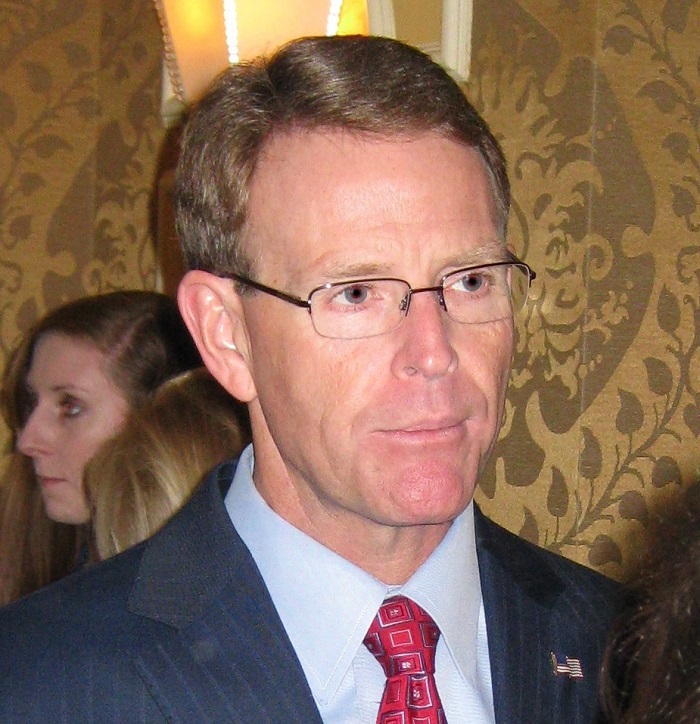 |
A former Louisiana state legislator, Perkins oversees an organization that constantly attacks Democrats while going out of its way to make excuses for the moral failings of Trump and other Republicans. When word of Trump’s affair with Daniels surfaced, Perkins leaped to the president’s defense. He told a podcast sponsored by Politico in January 2018, “We kind of gave him, ‘All right, you get a mulligan. You get a do-over here.’” (“Mulligan” is a golf term for a “do-over” shot.) Perkins said it was acceptable to overlook Trump’s behavior because evangelicals were “tired of being kicked around by Barack Obama and his leftists.” Perkins was criticized for the statement and issued a sort of clarification. In a note to supporters, he said, “[T]he reality is, he has kept his promises, so why would we stop supporting him based on allegations of repugnant behavior from more than a decade ago? This isn’t blind allegiance on the part of evangelicals. This is reasoned support for a political leader who has made and kept his campaign promises.” |
But in fact, Perkins has more or less given Trump blind allegiance. He has said nothing critical in the face of Trump’s alliance with the Russians, his crude behavior or his frequent Twitter meltdowns. Like many Religious Right leaders, Perkins dismisses Mueller’s findings and has written the whole investigation off as sour grapes by Democrats.
In light of the damning allegations in the Mueller report, some commentators have suggested hitting Trump where he’s most vulnerable: his ethics (or lack thereof).
Writing in Newsweek magazine in April, Robert Reich, who served as Secretary of Labor during President Bill Clinton’s administration and is currently a professor of public policy at the University of California at Berkeley, recommended that Trump’s opponents “[r]eveal his moral loathsomeness.”
Asserted Reich, “Democrats and progressives tend to shy away from morality, given how right-wing evangelicals have used it against abortion, contraceptives and equal marriage rights. But that’s to ignore Americans’ deep sense of right and wrong. Character counts, and presidential character counts most of all.”
It’s too early to tell whether a strategy like that will be employed or whether it will work, but one thing’s for sure: Anyone who tries it will soon be confronted with a volley of metaphorical return fire from Trump’s loyal band of evangelical sycophants.


